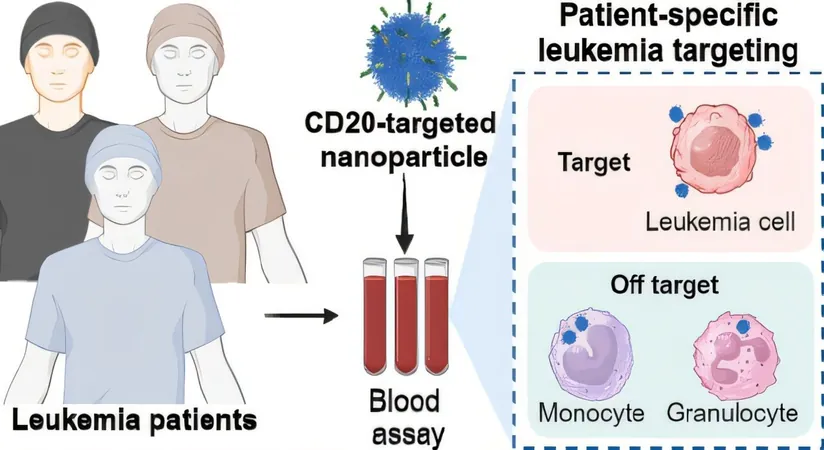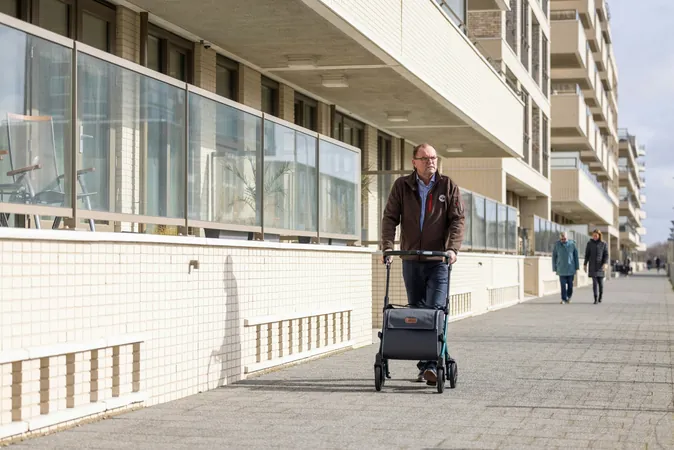
Revolutionary Blood Test Paves the Way for Personalized and Safer Cancer Treatments!
2024-12-16
Author: Wei
Revolutionary Blood Test Paves the Way for Personalized and Safer Cancer Treatments!
In a groundbreaking development, scientists from RMIT University and the Doherty Institute have unveiled a cutting-edge blood test that has the potential to transform cancer treatment for patients across the globe. This innovative test not only promises safer therapies but also aims to tailor treatments specifically to individual patients.
The research, titled "Patient-specific nanoparticle targeting in human leukemia blood," has been published in the prestigious journal *ACS Nano*. In Australia, approximately one in two individuals will be diagnosed with cancer by the age of 85, highlighting an urgent need for advancements in treatment approaches.
This revolutionary, first-of-its-kind test allows for a rapid assessment of various polyethylene glycol (PEG)-based nanomedicines, which are designed to target and destroy cancer cells while minimizing harm to healthy tissues. With just a drop of blood from patients diagnosed with leukemia, a type of blood cancer, the scientists can evaluate the effectiveness of these nanomedicines in real-time.
What are nanomedicines?
These minuscule particles—far smaller than a cell—are engineered to deliver drugs precisely to diseased cells. Approved nanomedicines such as Doxil, Onpattro (patisiran), and Vyxeos are currently utilized in clinical settings in Australia and the United States, with more innovative options on the horizon.
Dr. Yi (David) Ju, an Australian Research Council DECRA Fellow at RMIT University, spearheaded the study alongside Professor Stephen Kent from The University of Melbourne and Professor Constantine Tam, Head of Lymphoma Service at The Alfred. While this promising test is not yet available in hospitals or clinics, plans are in motion for future collaborations with industry partners and government support to bring this technology to fruition within the next few years.
The researchers emphasize the significance of their findings in understanding how different nanomedicines interact with blood cells in leukemia patients. “Our study sheds light on why some cancer patients respond better to nanomedicine therapies than others,” stated Dr. Ju.
How the Study Was Conducted
The team conducted experiments involving three distinct PEG-based nanomedicines on blood samples from 15 leukemia patients, incubating them at 37 degrees Celsius. This setup allowed researchers to analyze how effectively each nanomedicine targeted cancer cells versus healthy cells, paving the way for personalized treatment strategies.
The Exciting Findings
Much of the study focused on the impact of immune responses on treatment effectiveness. Previous research indicated that high levels of anti-PEG antibodies—often a result of mRNA vaccinations—may decrease the efficacy of future mRNA therapies, including those targeting cancer. The new study reinforced this, showing that immune system variations significantly influenced how well nanomedicines performed against cancer cells and the side effects experienced by patients.
Observations revealed that higher levels of these anti-PEG antibodies correlated with reduced effectiveness of therapies, demonstrating a potential risk of targeting healthy cells instead of cancer cells. Notably, while Doxil is commonly used for treating ovarian cancer and myeloma, it’s less effective for leukemia, although it was still found suitable for some patients in this study.
The researchers discovered that their own formulation of pure PEG nanoparticles was the most effective treatment against leukemia.
Looking Ahead: A New Era in Cancer Treatment
These findings lay the groundwork for the development of next-gen cancer nanomedicines and could refine patient selection for personalized therapies. The researchers believe that straightforward blood tests could revolutionize current treatment paradigms, potentially benefiting patients with a variety of cancers, including solid tumors like breast and ovarian cancers.
Professor Tam stated, “Understanding individual immune responses could be key to creating safer and more effective treatments by customizing nanoparticle formulations for each patient.” Meanwhile, Professor Kent expressed strong interest in partnering with pharmaceutical companies to expedite bringing this groundbreaking technology into clinical practice.
As hope for the future of cancer treatment shines brighter, this innovative blood test could very well change the landscape of how we approach personalized medicine, making treatments not only more effective but also safer for millions around the world!





 Brasil (PT)
Brasil (PT)
 Canada (EN)
Canada (EN)
 Chile (ES)
Chile (ES)
 España (ES)
España (ES)
 France (FR)
France (FR)
 Hong Kong (EN)
Hong Kong (EN)
 Italia (IT)
Italia (IT)
 日本 (JA)
日本 (JA)
 Magyarország (HU)
Magyarország (HU)
 Norge (NO)
Norge (NO)
 Polska (PL)
Polska (PL)
 Schweiz (DE)
Schweiz (DE)
 Singapore (EN)
Singapore (EN)
 Sverige (SV)
Sverige (SV)
 Suomi (FI)
Suomi (FI)
 Türkiye (TR)
Türkiye (TR)